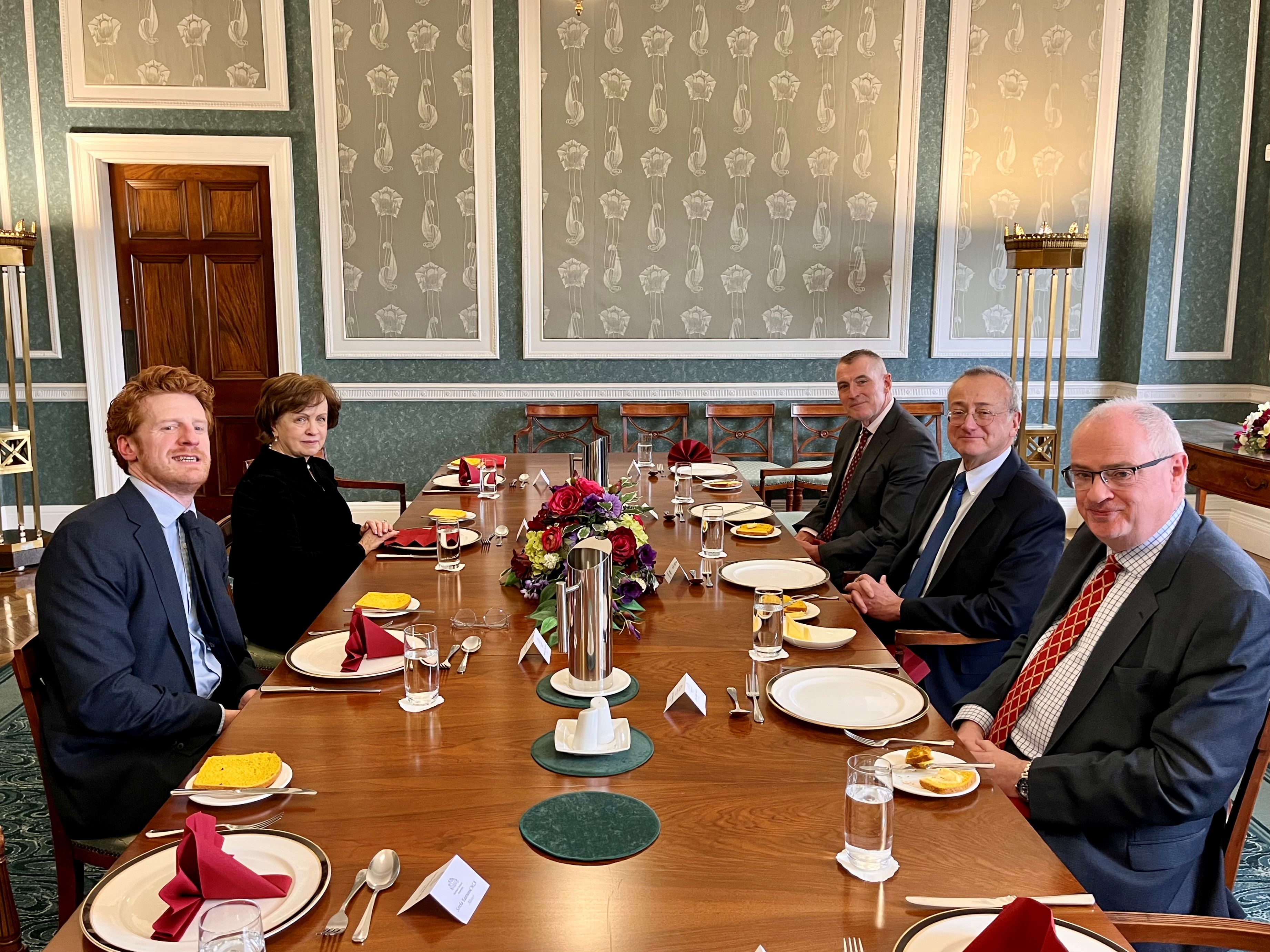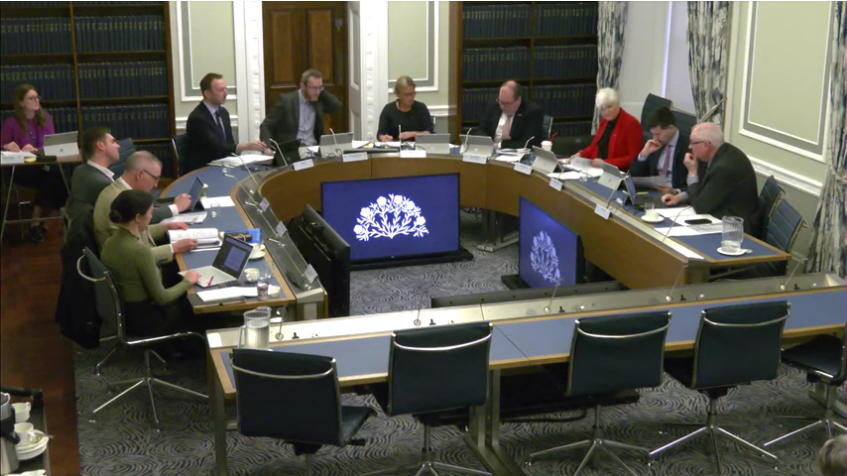Brexit & Beyond newsletter
19 February 2024
 Welcome to the 19 February 2024 Brexit & Beyond newsletter
Welcome to the 19 February 2024 Brexit & Beyond newsletter
Last week, committees at the Assembly commenced their work scrutinising Executive departments. The Windsor Framework Democratic Scrutiny Committee met for the first time. The House of Lords debated regulations which are part of the ‘Safeguarding the Union’ deal. Today’s newsletter also includes analysis by QUB of this deal, and of the Stormont Brake. The EU Ambassador to the UK Pedro Serrano visited Belfast. He met with the Speaker, First Minister, deputy First Minister, and held discussions with MLAs.

EU Ambassador to the UK Pedro Serrano (second from right) meeting with MLAs Matthew O’Toole, Diane Dodds, Declan Kearney and Steve Aiken
This week at the Assembly, Ministers from the Executive Office and the Department for Agriculture, Environment and Rural Affairs will take questions in the chamber. The Windsor Framework Democratic Scrutiny Committee will consider its first notification of an EU law, which may apply in NI. Tomorrow, 20 February, the Secretary of State for Northern Ireland Chris Heaton-Harris will give evidence to the Commons NI Affairs Committee.
- Northern Ireland Assembly scrutiny
- Lords debate ‘Safeguarding the Union’ legislation
- The Windsor Framework: analysis and implementation
- Other news
Northern Ireland Assembly scrutiny
Democratic Scrutiny Committee
The Windsor Framework Democratic Scrutiny Committee met on Thursday, 15 February, and agreed its processes and procedures. Established as part of the Windsor Framework, the role of the Democratic Scrutiny Committee is to assist with the observation and implementation of Articles 13(3a) and 13(4) of the Framework – these deal with how replacement or new EU law can apply in Northern Ireland. Following notification by the UK Government of replacement or new EU law, the Committee may scrutinise these laws, undertake inquiries and reports, and engage with stakeholders.
The Committee discussed the matter of potential ‘dual divergence’: this issue has been highlighted by academics including QUB’s Dr Lisa Claire Whitten, who notes that if the Stormont Brake is successfully pulled, NI would follow a “historical version” of an EU law, which may not be in place in the rest of the UK, nor in Ireland/the EU. Joël Reland calls this concept “trivergence”, pointing out that the scenario would create three separate sets of rules. The Committee has written to Executive Ministers and MLAs, setting out its functions and information about how it will conduct its business. At this week’s meeting, the Committee will consider a notification on an EU proposal, which aims to grant equivalence with EU requirements for seeds produced in the Republic of Moldova and Ukraine. This would make it possible to import seed of certain species from the respective countries into the EU.

The Windsor Framework Democratic Scrutiny Committee, chaired by Philip McGuigan (Sinn Féin)
Committee for the Economy
At the Committee for the Economy, Sorcha Eastwood (Alliance) asked officials about work to ensure businesses can take advantage of NI’s dual market access to the EU and UK. Permanent Secretary for the Department for the Economy Ian Snowdon said a team is “trying to understand exactly what those opportunities actually look like and how the Windsor Framework and the Protocol arrangements will work in practice”. He added that “it’s still relatively early days” and businesses are “very keen for us to be able to tell them what it means in practice”. He said this means “understanding how the divergence of regulations in particular will work out…we're still analysing and scoping out what the nature of the issues are.” Snowdon said potential investors “want certainty around these things and so we need to make sure that we work quite quickly to try to develop that degree of certainty as much as we can.” Joël Reland from the UK in a Changing Europe has written an explainer on regulatory divergence, and the implications of the Windsor Framework, and the Safeguarding the Union command paper in this regard.
Snowdon told the Committee that it became apparent in the early stages of the operation of the Protocol that some businesses in many parts of the EU “don't understand what the Protocol means and this dual market access is not actually understood by them so they will reject goods from Northern Ireland believing it to be from outside the EU”. He said there is “quite a bit of work” to do, both through the UK Government and with EU counterparts, “to try to make sure that knowledge and understanding is expanded.”
Written questions
With an Executive in place, MLAs have been submitting written questions to Ministers. You can view all questions and answers on the Assembly website. The Minister of Health has given figures on the use of the Cross-Border Healthcare Scheme, which is no longer in force after Brexit.
In response to a question from Jim Allister, the Minister for Agriculture states, “There are no plans to dismantle the current Sanitary and Phytosanitary (SPS) inspection facilities at Northern Ireland ports, as they are required to facilitate necessary checks on SPS goods moving into Northern Ireland from Third Countries as set out in the Official Controls Regulation and as explained in the Command Paper 1021, Safeguarding the Union.”
Mr Allister also asked the Minister for the Economy for his assessment of the Government’s commitment (in its recent Command Paper) that more than 80% of all freight movements from GB to NI will take place under the UK internal market system. The Minister states, “Operation of the lane, and therefore data and movements, are the responsibility of the British Government.”
Lords debate ‘Safeguarding the Union’ legislation
On 13 February, the House of Lords considered and approved the Windsor Framework (Constitutional Status of Northern Ireland) Regulations 2024 and the Windsor Framework (UK Internal Market and Unfettered Access) Regulations 2024. This legislation has been introduced as part of the agreement reached by the DUP and UK Government on 31 January, ‘Safeguarding the Union’. Minister in the Northern Ireland Office Lord Caine told peers that the Government is “now working with vigour to deliver on the commitments set out in the Command Paper”.
Lord Caine said the Government’s view is that the legislation “ensures that Northern Ireland’s constitutional status within the United Kingdom is put beyond any shadow of a doubt”. He asserted, “The presumption of automatic alignment with EU goods law is ended; Northern Ireland’s access to the UK internal market is safeguarded; treaties that might create barriers within the UK’s own internal market are prohibited; Bills that are put before this House that impact trade with Northern Ireland will be rigorously screened; the operation of a consent vote in the Assembly is enshrined; and action by public authorities consistent with protecting the UK internal market is ensured.”
The Windsor Framework: analysis and implementation
QUB has published an explainer on the ‘Safeguarding the Union’ Command Paper, published by the UK Government on 31 January. It concludes that the deal is “is a welcome next step in the process of minimizing the disruptive effects of Brexit on Northern Ireland and Northern Ireland’s place within the post-Brexit UK-EU relationship.” QUB will be holding its latest post-Brexit clinic on Thursday at 11.30am, with analysis of developments around the Windsor Framework and the findings of the most recent LucidTalk poll on the Windsor Framework.
The British-Irish Chamber of Commerce has welcomed the Safeguarding the Union agreement, stating it “represents a significant step in realising Northern Ireland as ‘the world’s most exciting economic zone’, with access to both the UK and EU markets.”
Stormont Brake
QUB’s Professor David Phinnemore and Dr Lisa Claire Whitten have published their assessment of the Stormont Brake. The report considers the volume of EU laws which fall within the scope of the Brake, and which may meet the threshold for its use. Based on EU legislation in 2023, it finds only one EU regulation – on deforestation – would be in scope and potentially meet the criteria of having “a significant impact specific to everyday life of communities in Northern Ireland in a way that is liable to persist”. They conclude that the likelihood of many EU amended or replacement acts meeting the ‘content and scope’ criterion for pulling the Stormont Brake “appears to be low”.
Pet travel
The UK Government is legislating through the Windsor Framework (Non-Commercial Movement of Pet Animals) Regulations 2024, to implement the arrangements in the Framework for the movement of pets from GB to NI. This means pet owners will need to apply for a pet travel document (valid for the lifetime of the pet), and dogs, cats and ferrets must be microchipped. Pet owners must declare that the pet animal will not subsequently be moved into the EU. NI pet owners can travel to and from GB if their pet is microchipped, without further requirements.
Other news
- The Northern Ireland High Court reserved judgement in the application for judicial review of the UK Illegal Migration Act. It will deliver its judgement on this case, and on another application in relation to Article 2, on 14 March. The NI Human Rights Commission applied for the review on the grounds that it breaches Article 2 of the Windsor Framework, the 1951 Refugee Convention and the European Convention on Human Rights (ECHR). Under Article 2 of the Protocol, the UK Government committed to ensuring that there would be “no diminution of rights, safeguards or equality of opportunity” (as set out in the Good Friday Agreement) as a result of the UK leaving the EU.
- The UK Government has published information leaflets for businesses to help them prepare for the arrangements under the Border Target Operating Model (BTOM). The BTOM establishes the UK’s post-Brexit border controls with the EU. The first stage entered into force on 31 January.
- The Commons European Scrutiny Committee has published its latest report. Its analysis covers formaldehyde and changes to EU REACH legislation; and the extension of rules of origin for electric vehicles and batteries.
- The Welsh Government has responded to a report from the Senedd Legislation, Justice and Constitution Committee’ on UK-EU governance. It believes it should be able to participate in relevant meetings under the Withdrawal Agreement, as part of the UK delegation. Currently the NI Executive is the only devolved Government invited to take part.
- The European Commissioner for Research Iliana Ivanova met with UK Secretary of State for Science Michelle Donelan in London on 12 January “to make a joint commitment to maximising UK Horizon Europe success for businesses, scientists and researchers”.



